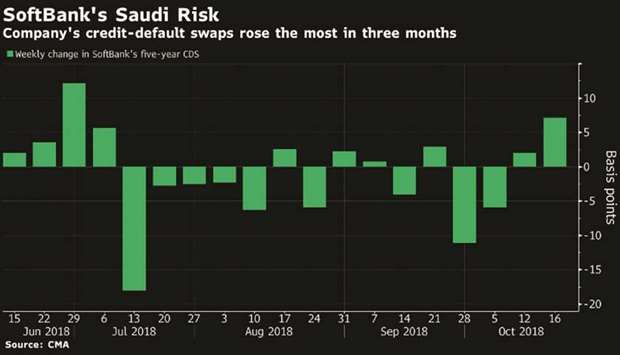Masayoshi Son has already paid a price for his close ties to Saudi Arabia. It could soon go much higher.
Son’s SoftBank Group Corp plummeted the most in more than two years on Monday after Saudi Arabia came under fire for the disappearance of journalist Jamal Khashoggi. The kingdom is the biggest outside investor in SoftBank’s $100bn Vision Fund, which has backed Uber Technologies Inc, WeWork Cos, Didi Chuxing and Slack Technologies.
Though Saudi officials have denied wrongdoing, Turkish authorities allege the Washington Post writer was murdered after entering a Saudi consulate in Istanbul. The US is pressing for an explanation and considering punishments, while business leaders including the CEO of Uber have pulled out of Saudi Arabia’s “Davos in the Desert” event. SoftBank’s Monday plunge brings the decline in its market value from a September peak to $22bn.
Saudi Arabia’s King Salman has ordered an internal investigation into the Khashoggi’s disappearance, which could hold people accountable if the evidence warrants it, according to a Bloomberg report on Monday.
The trouble for Son is that his grand vision depends on Crown Prince Mohammed bin Salman, who pledged $45bn for the Vision Fund after a 45-minute pitch from Son and has promised a similar amount for the next fund. Not only are those commitments now in question, but SoftBank could face a revolt in Silicon Valley if entrepreneurs begin to think taking its cash is akin to blood money.
“If the Saudis are implicated in the murder, you might find a lot of investors not willing to take their money,” said Chris Lane, an analyst at Sanford C Bernstein & Co. “This could start to freeze the Vision fund out of future deals. This also potentially puts Vision Fund II at risk.” SoftBank shares had gained 29% this year through September 28 as investors began to credit Son for his ambitious investments in technology startups in the US, China and beyond.
But the stock has tumbled 19% since then amid the Saudi controversy and a broad decline in technology shares, including a 7.3% drop on Monday.
A spokesman for SoftBank declined to comment. Saudi Prince Mohammed has said Khashoggi left the consulate building unharmed, but Saudi officials have given no evidence to back up that assertion. On Monday, Amir Anvarzadeh, a senior strategist with Asymmetric Advisors in Singapore, removed SoftBank from his list of recommended stocks to buy. In a research note, he explained the risks of the Saudi controversy and the tech stock rout.
“Although we don’t expect this latest diplomatic incident to lead to any sanctions on Saudi, there is always some possibility that some firms will pull out their money from the Vision Fund,” Anvarzadeh wrote. “However, we are starting to worry about other more likely scenarios that could prove as disruptive to Son’s plans. Firstly and most importantly, we believe tech names will remain under selling pressure.”
Jeff Kingston, a professor at Temple University in Tokyo, said SoftBank could see its reputation take a hit with technology startups if the Saudi regime is found culpable. Tech workers have increasingly pressured employers to steer clear of relationships they see as politically compromised. Google, for example, decided not to renew a contract with the US Defense Dept. after protests from employees. “Son is going to find a chillier welcome in Silicon Valley,” said Kingston. “The whole ethos of these young venture capitalists is they want to make the world a better place. That’s hard to reconcile with the vision of darkness that Saudi Arabia is projecting.”
If a boycott materialises, it could prove a serious setback. Son has made venture investments for decades, dating back to early bets on Yahoo! Inc and Alibaba Group Holding. He began stepping up his technology investments last year as he raised the first Vision Fund and explained he sees unprecedented opportunities in artificial intelligence, autonomous driving and other technologies.
He has grabbed the biggest equity stakes in many of the world’s most prominent startups, including Uber, and confounded Silicon Valley rivals with his unprecedented deal-making. In an interview with Bloomberg last month, he said he plans to raise a new $100bn fund every two or three years.

Soft Bank
